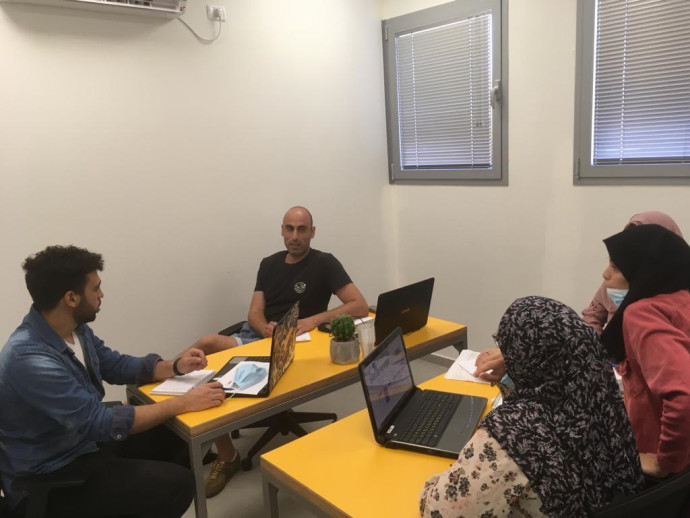While the Israeli hi-tech sector as a whole is managing to find workers to fill its many positions, Israeli start-ups in particular may be left twisting in the wind – especially amid signs of waning interest from the international market.
The recently-released State of High-Tech 2022 report published by the Israel Innovation Authority (IIA) highlighted several milestones reached in the sector over the last 12 months, including data on the effort to recruit workers into the hi-tech industry, which has grown to represent more than half (54%) of Israel’s national export.
For all of hi-tech, things are looking good: for the first time, employment in hi-tech has exceeded 10% of all employment in Israel, with 19% of Israelis aged 30-34 being employed in tech positions in all branches of the market. As well, the rate of Israelis aged 45-49 employed in hi-tech doubled over the past decade, from 6% in 2012 to nearly 12% in 2021.
However, only 8% of those employed in hi-tech are at companies defined as young start-ups, a statistic which illustrates the current challenge many fledgling start-ups face: with an industry as saturated as Israel’s, the pool of easily-accessible hirees has become increasingly limited – especially if you’re mostly looking for young male Jews.
That very narrow subset of eligible workers seems to have been the popular choice until now, as Arabs, ultra-Orthodox Jews and women across the board are marginalized in today’s start-up landscape.

While there has been a significant push from companies and organizations to promote a stronger gender balance in the start-up sector, so far the numbers paint an unbalanced picture.
According to a report from Power In Diversity, only 23.3% of management positions in Israeli start-ups are held by women. On average, small-scale startups have 30.8% female representation at all levels, while mid – to large-scale businesses have 33% and 36% representation, respectively.
Similarly, efforts have been made in recent months to promote the education and selection of workers from Arab and ultra-Orthodox populations: in January, the Israel Innovation Authority and the Department for Economic Development of Minority Sectors at the Social Equality Ministry launched a five-year program to promote high-tech in Arab society. The program is part of the government’s Impact for Arab Society program, as well as the Takadum (progress) five-year plan for the economic development of the Arab sector led by the Social Equality Ministry.
IN SPITE of these initiatives, this year saw a stagnation in the hiring rate of the Arabs, and a 6% decline in the rate of ultra-Orthodox workers. The proportion of ultra-Orthodox and Arab hi-tech employees hasn’t increased, standing at 4.7% in 2021, according to the IIA.
“The report shows that the continued prosperity of the industry is under threat from industry over-concentration, both geographically and demographically,” said the IIA’s CEO, Dror Bin. “Without focused and wide-ranging government effort, Israel will struggle to preserve its position. In the long-term, a coordinating arm is needed to accelerate and connect between all the players in the field.”
Besides diversity, education also plays a critical role in increasing the hiring pool. Around 11% of Israeli students study computer science for their undergraduate degree, making it the most popular degree in the past year. Despite the nation’s efforts to get educated, it seems to be shooting itself in the foot, however: Israel is a global leader in cooperation between academia and industry, but only 15% of these collaborations are with Israeli companies, says the IIA. Israel is planting the seeds of a brilliant workforce, but only reaping a fraction of the benefits.
Even if Israel’s hi-tech sector and the start-up industry at its heart get their hiring pool problems sorted out, the road ahead may still be especially turbulent for the latter, as there have been signs that investment in start-ups may soon become more of a risky liability than a guaranteed win.
In the wake of geopolitical tensions, a US stock market plunge and COVID-induced inflation, many start-ups have been forced to downsize and in some cases, postpone their entry to the public trading market while they struggle to keep their fledgling businesses afloat.
In turn, investors have started dumping their stock in start-ups. In a report from the New York Times, Phil Haslett, a founder of the pre-IPO stock marketplace EquityZen, explained that the number of people and groups trying to unload their start-up shares doubled in the first three months of the year from late last year.
“It’s the first sustained pullback in the market that people have seen in legitimately 10 years,” he said.
While Haslett referred to the US start-up market, it is by no means an isolated phenomenon. Despite Israeli hi-tech seeing 88 so-called mega-fundraising rounds of over $100 million (NIS 346 m.) during the past year, the market value of Israeli technology companies on NASDAQ fell during the same period by around 10%.
The last few years’ perfect storm of economic challenges has thrown the start-up industry onto its back, exposing a soft and bubble-shaped belly. Without economic stability, the industry as it has existed until now could go extinct.
A key manifestation of that stability could come from government investment, said Dr. Ami Appelbaum, chairman of the IIA. “Israel can’t bury its head in the sand and expect that, without long-term investment in hi-tech, the economy’s main export sector will continue to lead in the global arena,” he said.
He added that “past national investments allowed Israel to claim its position as a global leader in the area of innovation and the country must continue to maintain this position.”
Or, at the very least, to keep its start-up bubble from bursting.
